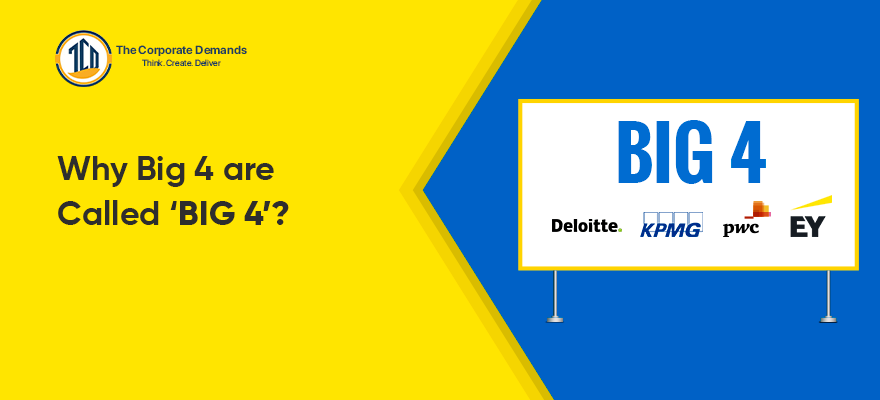Did you even know, there were Big 8 firms earlier which got reduced to Big 4 in the 1990-2000 mergers and closures? There are four major accounting firms worldwide that are commonly known as the Big 4. These firms are Deloitte, KPMG, PricewaterhouseCoopers, and Ernst & Young.
Among many of the finance industry, the “Big 4” accountancy firms have now become highly acknowledged and famous. For decades, they have been responsible for auditing and providing financial management services to some of the biggest companies worldwide.
In this blog post, we’ll explore what makes the Big 4 so special and why they are often referred to as the “Big 4.” So whether you’re looking for an accountant or need to get your finances in order, read on to learn more about the Big 4.
Big Four Overview
The table below shows a little introduction to the Big Four in key numbers.
| Big Four | Deloitte | PricewaterhouseCoopers | Ernst & Young | KPMG |
| Founded | 1845 | Merged with Coopers & Lybrand in 1998 | 1989 Merged firm Arthur Young & Co | 1987 through a merger |
| Revenue (2020) | $47.6 billion | $43 billion | $37.2 billion | $29.2 billion |
| Employees | 330,000 | 284,000 | 300,000 | 227,000 |
| Located in | 150 countries | 157 countries | 150 countries | 155 countries |
| Headquarter | New York, NY | New York, NY | New York, NY | Culver City, CA |
Why is the Big 4 Known as the Big Four?
The four largest accounting companies in the United States, as determined by revenue, are known as the “Big Four.” They are Klynveld Peat Marwick Goerdeler, PricewaterhouseCoopers (PwC), Deloitte, Ernst & Young (EY), and (KPMG).
The Big 4 additionally offers tax planning, management consultancy services, market research, assurances, valuations, and legal advising services in addition to auditing. They are the foremost authority on changes to auditing and accounting standards as well as the go-to resource for interpreting tax law.
To meet the demands of businesses in the digital age, The Big Four also provide advice for digital transformation.
How did the Big 5 Become the Big 4?
Until 2002, the top 5 accounting firms in the world were the Big 5. The large eight accounting firms came together to establish them. They started as a group of numerous smaller member companies and went on to create the Big 4 enterprises.
In 1989, they stopped being the eighth-largest accounting company in the world. Arthur Young and Ernst & Whinney merged in June 1989. In the same year, Deloitte Haskins Sells also merged. Together, they formed Touche Ross. The big 6 accounting firms were created as a result. With the merging of Pricewaterhouse and Coopers & Lybrand in 1998, the big 6 accounting firms came to an end.
The top 5 Accounting firms were:
- Ernst & Young
- Deloitte & Touche
- Arthur Andersen
- KPMG
- PriceWaterhouseCoopers
Arthur Andersen’s reputation suffered a setback in 2002, and it was no longer considered one of the Big Five accounting firms.
Which Big 4 is the Biggest in India?
After the September quarter, an ET examination of all publicly traded corporations found that three of India’s Big Four firms—EY, KPMG, and the Deloitte group of affiliate firms—were within striking distance of one another on the audit leaderboard.
The Big Four firms in India use linked organizations to carry out their audit job. With 153 mandates, the EY group has taken the lead in the market, and the KPMG group will audit 147 businesses.
According to the research of the auditors of all listed firms, Deloitte affiliates are at number three with 141 clients, while Grant Thornton Bharat LLP associates are in fourth place with 87 audits.
The PwC affiliates have chosen to concentrate on high-quality MNC clients with low risk profiles and strong profitability when adding audit clients—70 listed corporations.
Big 4: Work Culture
The Big Four are all eager to tell you how unique they are due to their cultures. Sadly, this can result in them sounding remarkably alike. Speaking with those who have worked for other cultures is the best approach to comprehending the distinctions between them. These are some things to remember:
The employees at PwC are aware that their company is the most prestigious of the four. There is a sense of permanence here that you might not find, for instance, at Deloitte, thanks to the firm’s reputation and strong audit business.
In the UK, Deloitte is smaller than PwC and eager to catch up. It has a stronger emphasis on consulting, thus it is constantly looking for new projects. This creates a goal-oriented, competitive, and result oriented culture.
EY has a record for inclusion and has historically supported LGBTQ rights as well as women’s advancement. One of the nicer workplaces is claimed to exist there.
KPMG is renowned for its superior personnel development, with key qualification pass rates that are greater than the industry average. Its culture is eccentric, and there is less pressure to conform to the traditional metropolitan graduate lifestyle there.
Big 4: Pros and Cons
Here are some of the pros and cons of working with the giant corporate The Big 4.
 |
 |
| Work with the Best |
Long Hours |
| Amazing Clients |
Pressure |
| Flexibility |
Travel |
| Responsibility |
Promotion Policies |
| Growth Opportunities |
Lack of Variety |
| Job Security |
Annual Leave Blackout |
| A Huge CV Boost |
Low Salaries Compared to Industry & Commerce |
Future of Big 4
The future of The Big 4 organisations is incredibly secure as long as they continue to produce work of a better caliber. The Big 4 have continued to grow steadily, albeit more slowly than some sectors. The stability is a result of each company’s global presence.
To increase efficiency, the Big 4 firms are experimenting with reducing job responsibilities for audits and making better use of technology. Accountancy professionals will have a tonne of new chances as a result of this transformation. Use it and set high goals.
It’s vital to keep in mind that further training and/or certificates are needed to work in accounting. For instance, a CPA needs to pass the exam and obtain their license.
Conclusion
The largest four accounting firms in the US are known as The Big Four. Although having a sizable workforce, these businesses are not without their detractors. The main criticism directed at them is that they don’t probe their clients with the probing questions required to find fraud.
I hope you found this article informative. For more such related blogs, follow The Corporate Demands.
Know about What is Google X-ray Search?

